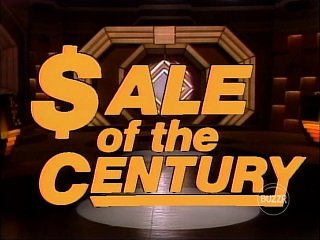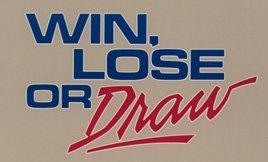
A game show is a genre of broadcast viewing entertainment where contestants compete for a reward. These programs can either be participatory or demonstrative and are typically directed by a host, sharing the rules of the program as well as commentating and narrating where necessary. The history of game shows dates back to the invention of television as a medium. On most game shows, contestants either have to answer questions or solve puzzles, typically to win either money or prizes. Game shows often reward players with prizes such as cash, trips and goods and services provided by the show's sponsor.

Family Feud is an American television game show created by Mark Goodson. It features two families who compete to name the most popular answers to survey questions in order to win cash and prizes.
Family Fortunes is a British television game show based on the American game show Family Feud. The programme ran on ITV from 6 January 1980 to 30 December 2002. A celebrity version, All Star Family Fortunes, followed from 2006 to 2015. In 2020, the original version of the show returned after 18 years with Gino D'Acampo as host.
Remote Control is a TV game show that ran on MTV for five seasons from 1987 until 1990. It was MTV's first original non-musical program and first game show. A concurrent syndicated version of the series ran during the 1989-90 season and was distributed by Viacom. Three contestants answered trivia questions on movies, music, and television, many of which were presented in skit format.

Supermarket Sweep is an American television game show. The format combines an ordinary team-based quiz show with the novel concept of a live, timed race through a supermarket. In the timed race, cameras follow the teams with shopping carts through a large vacated supermarket with several aisles; the value of items thrown into the cart determine the winning team. The original show was broadcast on ABC from December 20, 1965, to July 14, 1967. Later seasons aired on Lifetime from February 5, 1990, to June 16, 1995, and later from April 3, 2000, to May 23, 2003, with reruns airing until March 26, 2004. Another version of the show aired from October 18, 2020, to January 30, 2022, also on ABC.

Sale of the Century is an American television game show that originally debuted on September 29, 1969, on NBC daytime. It was one of three NBC game shows to premiere on that date, the other two being the short-lived game shows Letters to Laugh-In and Name Droppers. The series aired until July 13, 1973, and a weekly syndicated series began that fall and ran for one season.

Win, Lose or Draw is an American television game show that aired from 1987 to 1990 in syndication and on NBC. It was taped at CBS Television City, often in Studios 31, 33, and 43 at various times. It was co-produced by Burt & Bert Productions and Kline & Friends for Disney's Buena Vista Television. It has also had two versions on The Disney Channel: Teen Win, Lose or Draw from 1989 to 1992, and a revived version known as Disney's Win, Lose or Draw which aired in 2014. New York described Win, Lose or Draw as "a knockoff" of the board game Pictionary.
The Joker's Wild is an American television game show that aired at different times between 1972 and 2019. In the show, contestants answer questions based on categories determined randomly by a mechanism resembling a slot machine. The show's title refers to the game's slot-machine mechanism also having jokers.

Des chiffres et des lettres is a French television programme. It was created by Armand Jammot and tests the numeracy skills and vocabulary of two contestants. It is one of the longest-running game shows in the world, and the inspiration for Countdown on Britain's Channel 4.

Now You See It is an American television game show created by Frank Wayne for Mark Goodson-Bill Todman Productions. The object of Now You See It is to answer general knowledge trivia questions by finding the answers hidden in a grid, similar to a word search puzzle.
Idiot Savants was an American television game show on the MTV network which ran from December 9, 1996, to April 25, 1997. It was created by Michael Dugan and Chris Kreski, directed by Steve Paley, and hosted by comedian Greg Fitzsimmons.
100 mexicanos dijeron, later rebranded to 100 mexicanos dijieron, is a Mexican version of the Goodson-Todman game show from the 1970s, Family Feud, produced in Mexico City by the Las Estrellas.

Bert's Family Feud was an Australian game show remake based on the American show of the same name. The series was produced by Grundy Television in conjunction with FremantleMedia. It was broadcast on the Nine Network and hosted by Bert Newton. The title refers to host Bert Newton as the show intended to feature celebrities and their families as contestants.
Blokken (Blocks) is a Belgian quiz show based on the video game Tetris. It is broadcast by één and hosted by Belgian television personality Ben Crabbé. The show is the longest running quiz show on Belgian television, with 22 seasons. On 10 December 2017 the show aired its 5000th episode.
¿Qué dice la gente? is a Spanish-language adaptation of the American game show Family Feud which was produced in the United States, that aired on Spanish-language channel Telefutura in 2006. It was itself the American version of Mexican game show, 100 mexicanos dijeron, originally hosted by Marco Antonio Regil for two seasons from 2006 until 2008 followed by Omar Chaparro who took over for the last nine weeks of the series when it was filmed in Miami. Jackie Vilarino and Survivor: Nicaragua Contestant Brenda Lowe both served as co-hosts for the show's run. The show premiered on June 12, 2006, and ended on November 14, 2008. In 2008, the show was reduced to a half-hour in order to pair up with the Spanish-language version of the short-lived 1982-83 American game show Child's Play under the name Dame la Pista or hosted by Alessandra Rosaldo, but it was ultimately cancelled along with ¿Qué dice la gente? for "unknown" reasons.

Family Feud was an Australian game show based on the American show of the same name. It aired on Network Ten from 14 July 2014 until 22 July 2018 and in August 2020 for a special 10-episode series. The show was hosted by Grant Denyer. This was the fourth Australian version of the format, the previous incarnation being Bert's Family Feud hosted by Bert Newton in 2006. Ten became the third network to adapt the format. From 2016, Ten also screened a celebrity edition titled All Star Family Feud. The show was filmed at Global Television Studios in Southbank, Melbourne from 2014 to 2017 and at Network Ten Studios in Pyrmont, Sydney in 2018 & 2020.

Blockbusters is an American game show, created by Steve Ryan for Mark Goodson-Bill Todman Productions, which had two separate runs in the 1980s. On this program, contestants answered general-knowledge questions to complete a path across or down a game board composed of hexagons. The first series of the show debuted on NBC on October 27, 1980, and aired until April 23, 1982. In the first series, a team of two family members competed against a solo contestant. Blockbusters was revived on NBC from January 5 to May 1, 1987, but featured only two solo contestants competing.

BrainSurge is an American children's game show that aired on Nickelodeon and was hosted by Jeff Sutphen. The show taped its first season in February 2009, and debuted on September 28, 2009. The show's format was adapted from the Japanese game show Brain Survivor. The U.S. version was created by Scott A. Stone, co-creator of Legends of the Hidden Temple, and Clay Newbill, executive producer of The Mole.
Family Feud was an Australian game show based on the American show of the same name. The program ran on the Nine Network from 1978 to 1984, and on the Seven Network from 1990 to 1996. The program has been revived twice, in 2006 and 2014.
Blockbusters was an Australian children's game show, broadcast on the Seven Network, where players from two schools competed over the course of a week, in a rolling format, where games could be started in the middle of an episode, and stopped and continued on the next episode. The school team earning the most points won a major prize for their school, such as an encyclopedia. The show was hosted by Michael Pope. It ran in Australia from 1991 to 1994.










